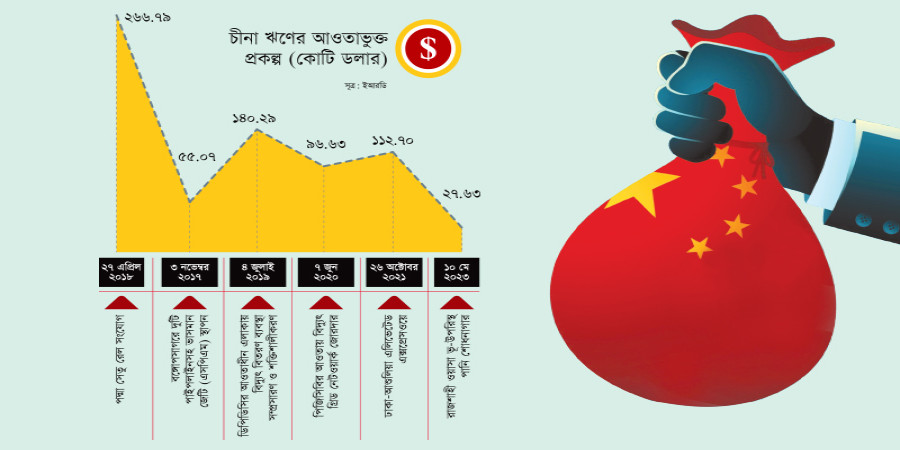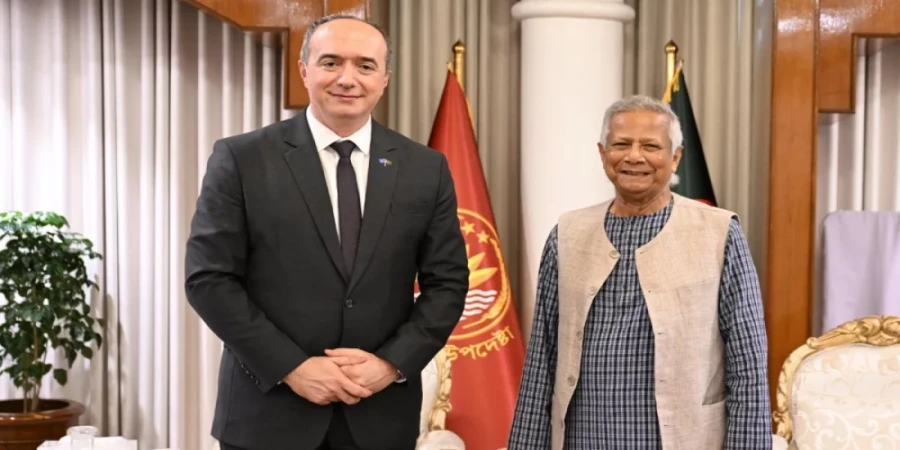
ছবি: Photo: Collected
The 11th National Parliamentary Elections of Bangladesh, held on December 30, 2018, delivered a landslide victory for the Awami League (AL) led by Sheikh Hasina, securing 288 seats in a total of 300. This massive win raised questions regarding the political implications and the subsequent response from key global players, particularly China.
Following the election, China was one of the first countries to congratulate Sheikh Hasina’s Awami League. On December 31, 2018, Chinese President Xi Jinping and Premier Li Keqiang sent congratulatory messages, which were delivered by the Chinese Ambassador to Bangladesh, marking a diplomatic milestone. Prior to the elections, China had already committed to significant loan agreements with Bangladesh, primarily focused on infrastructure projects related to transportation and energy.
However, from 2019 to mid-2023, there was a noticeable shift in China’s engagement with Bangladesh. Although the two countries continued their relationship, with regular loan commitments, project agreements, and disbursements, there was a marked absence of new large-scale infrastructure loans. This raised questions among analysts: Did China foresee potential vulnerabilities in Sheikh Hasina's government even before the 2023-2024 political transition?
One significant factor in this shift was the absence of major infrastructure loan agreements after mid-2023. China, which had been actively financing projects such as the Padma Bridge rail link, Karnaphuli Tunnel, and energy infrastructure projects, did not announce any new loans or financial aid. In fact, during Sheikh Hasina’s visit to China for discussions on bilateral cooperation, there were no major announcements regarding infrastructure loans. Instead, the visit resulted in the signing of 21 memorandums of understanding and seven joint declarations, with China offering a financial aid pledge of 1 billion yuan (approximately 14 million USD) due to Bangladesh's ongoing foreign reserve issues.
Experts have speculated that this shift in China’s approach could be linked to the perceived instability within Bangladesh’s political landscape. Analysts suggest that China, aware of the internal political challenges facing Sheikh Hasina’s fourth-term government, may have anticipated a change in leadership. This speculation is reinforced by the absence of large-scale investments in infrastructure projects during the period following the elections, especially given Bangladesh’s existing financial strain.
Dr. Shamsad Mortuza, Director of the China Studies Center at Dhaka University, noted that China’s current policy toward Bangladesh is characterized by a “wait and see” approach. According to Mortuza, while China has not stopped supporting Bangladesh, particularly in areas such as people-to-people connectivity and smaller-scale development projects, it has become cautious about making large investments in infrastructure. China is focusing more on “soft power” initiatives rather than committing to mega-projects, given the uncertainty surrounding the political and economic stability of Sheikh Hasina’s government.
Professor Kazi Mohammad Mahbubur Rahman, Associate Professor in the Department of Political Science at Dhaka University, added that China’s approach to Bangladesh is not solely based on political alignments but also considers broader geopolitical and economic factors. He explained that China likely understood that while Sheikh Hasina had completed three terms, her fourth term was likely to be fraught with challenges, both from internal political dynamics and international tensions, particularly regarding Bangladesh’s relations with India and the United States.
One of the key economic challenges that affected the bilateral relationship was the declining foreign reserves of Bangladesh, which has raised concerns about its ability to repay loans. This economic vulnerability could have influenced China’s decision to reduce its exposure in large-scale loans and projects in Bangladesh. Although China continued to support smaller initiatives, such as investments in people-to-people exchanges and some minor infrastructural projects, it refrained from committing to any new major investments in 2023 and 2024.
This shift also reflects a broader trend in China’s foreign policy, which now places greater emphasis on intellectual and diplomatic engagement. Instead of focusing solely on political alliances, China has been strengthening its presence through academic, cultural, and business exchanges. This approach allows China to maintain influence without making large financial commitments, which may have been deemed risky due to Bangladesh’s economic uncertainties.
China’s cautious stance can also be seen in the context of the ongoing geopolitical tension between the United States and Bangladesh. Given Bangladesh’s growing ties with China, coupled with its strained relationship with the U.S. and the complex geopolitical dynamics with India, China likely adopted a more reserved strategy, focusing on the long-term stability of its investments in the region.
A former Chinese ambassador to Bangladesh, Munshi Faiz Ahmed, commented that China had always been pragmatic in its approach to bilateral relations. While large-scale projects like the Padma Bridge and Karnaphuli Tunnel were undertaken with Chinese loans, the political instability in Bangladesh, coupled with the looming national elections, likely made China wary of committing to new projects during a period of uncertainty. Additionally, the political speculation surrounding Sheikh Hasina’s potential loss of power in the upcoming elections may have prompted China to take a more conservative approach in its investments.
Diplomats and trade analysts suggest that, much like other global powers, China closely monitors economic indicators and government stability before committing to major investments. Former diplomat M. Humayun Kabir noted that China’s strategy involves meticulous observation and analysis of economic trends and governance. He believes that China understood Bangladesh’s economic difficulties and, as a result, chose to scale back its large infrastructure investments.
In response to questions from Bangladesh’s Bonik Barta about the absence of major loans or agreements in 2023 and 2024, the Chinese Embassy in Dhaka confirmed that while financial assistance was offered during Sheikh Hasina’s visit to China, there were no new major loan commitments. The embassy emphasized the ongoing strategic cooperation between China and Bangladesh but also noted that any new developments in the relationship would be addressed as per evolving circumstances.
As Bangladesh approaches the 12th National Election, it is evident that China’s relationship with Bangladesh will continue to evolve. While the absence of new infrastructure loans raises questions about China’s long-term investment strategy, it is clear that China remains committed to supporting Bangladesh in areas where it can leverage its soft power, such as people-to-people connections and smaller economic projects.
repoter






